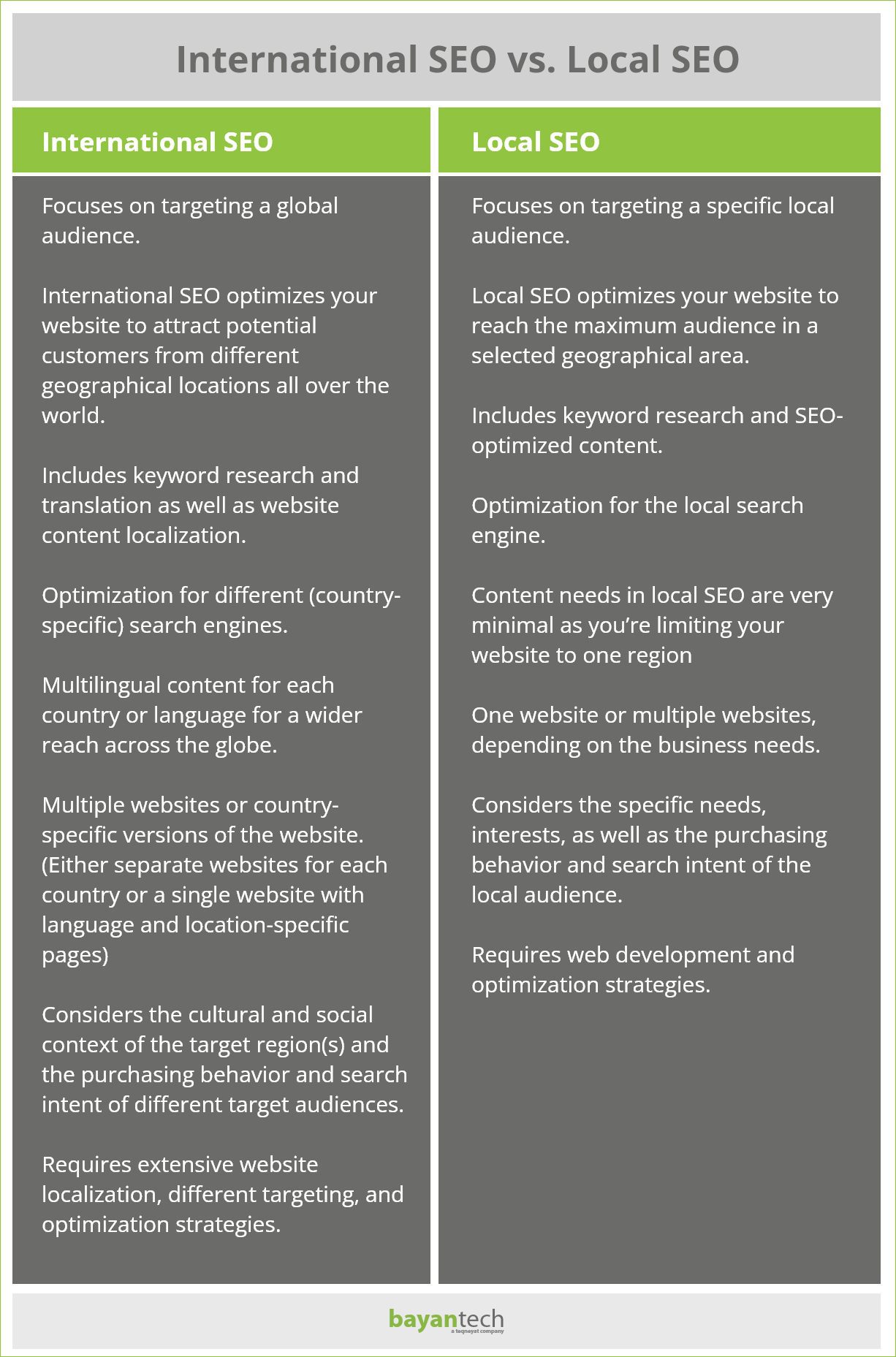Cracking the Code of International SEO: A Comprehensive Guide
Cracking the Code of International SEO: A Comprehensive Guide
Blog Article
Browsing the Digital Landscape: Leveraging International Search Engine Optimization for Cross-Border Success
In today's interconnected electronic globe, businesses are increasingly looking beyond boundaries to touch right into international markets. The complexity of navigating the electronic landscape on a worldwide range requires a nuanced strategy, from recognizing the principles of International Search engine optimization to applying geotargeting and multilingual key phrase methods.
Understanding International Search Engine Optimization Principles
Navigating the intricacies of international search engine optimization needs a solid grasp of fundamental principles to efficiently expand online visibility across boundaries. One important aspect of global SEO is recognizing the importance of localization. This entails customizing web site content to match the linguistic, social, and commercial differences of target audience. Key words should be not only equated however likewise adapted to reflect just how customers in various regions search for details.
Furthermore, having a clear understanding of geo-targeting is vital. This includes showing to browse engines the specific countries or regions a website is targeting. Implementing hreflang tags is one way to connect this information, making sure that the proper version of a page shows up in the search engine result for a user in a particular location.
Furthermore, understanding the effect of local online search engine and social media platforms is crucial for worldwide SEO success. As an example, while Google is leading in lots of areas, countries like China have their very own search engines like Baidu, requiring customized methods for each and every system to make the most of on the internet visibility.

Targeting Multilingual Keyword Phrase Techniques
Creating multilingual key words approaches is essential for properly reaching diverse global audiences and making best use of on-line exposure across various linguistic regions. When targeting multilingual search phrase strategies, it is vital to conduct complete research to comprehend the particular search terms and expressions used by the target market in each linguistic region. This entails not only equating key words yet also taking into consideration social nuances, regional languages, and search patterns distinct to each target audience.
To create an effective multilingual search phrase method, it is necessary to prioritize relevance and search intent. Key words need to line up with the web content on the web site and resonate with the social context of the target audience. Using devices such as Google Key Words Organizer, SEMrush, or Ahrefs can assist recognize high-performing key phrases in various languages and examine their search quantity and competition level.
Furthermore, surveillance and assessing the performance of multilingual keyword phrases on a regular basis is crucial for enhancing and refining the method with time. By continuously adjusting to changes in search habits and fads, businesses can boost their on-line presence and bring in even more international web traffic to their sites.
Applying Geotargeting and Hreflang Tags
When intending to boost global search engine optimization techniques, integrating geotargeting and hreflang tags is vital for maximizing internet site exposure throughout different areas. Geotargeting entails customizing content to specific locations, ensuring that individuals in various locations obtain get more appropriate information. By executing geotargeting, services can boost their regional search rankings and attract region-specific traffic.

Optimizing Web Site Structure for Global Exposure
To even more boost international Search engine optimization methods past geotargeting and hreflang tags, enhancing the internet site structure is important for attaining international visibility and taking full advantage of reach across different regions. A well-structured website not only improves customer experience however likewise helps with search engine crawlers in understanding the material and read the article context of the website.
Furthermore, creating language-specific subdirectories or subdomains can aid browse engines deliver the appropriate version of the web site to customers based on their language choices, even more boosting the total customer experience. In addition, enhancing URL frameworks to consist of appropriate key words and geotargeted terms can boost the website's presence in different areas. By structuring the website efficiently for international target markets, services can increase their possibilities of bring in worldwide web traffic and increasing their reach across boundaries.

Surveillance and Evaluating Cross-Border Efficiency
Reliable monitoring and analyzing of cross-border efficiency is crucial for evaluating the success of global SEO strategies and identifying chances for renovation in international reach and presence. By very closely tracking key efficiency signs (KPIs) throughout various markets, services can get useful insights into the performance of their cross-border search engine optimization initiatives. Keeping track of metrics such as organic website traffic, keyword rankings, try this website conversion prices, and bounce prices can supply a detailed view of how well a website is doing in various areas.
Analyzing cross-border efficiency data permits companies to determine patterns, patterns, and locations for optimization. By comparing efficiency across various countries, areas, or languages, companies can determine successful approaches and center content to better accommodate details target market. Furthermore, checking cross-border performance enables services to stay active and receptive in the ever-evolving digital landscape. Normal evaluation of search engine optimization performance on a global range guarantees that business can adapt their methods rapidly to maximize emerging opportunities and maintain an one-upmanship in worldwide markets.
Conclusion
In final thought, international SEO plays a vital function in attaining cross-border success by enhancing web sites for global visibility, targeting multilingual key words approaches, implementing geotargeting and hreflang tags, and monitoring cross-border efficiency. By comprehending the basics of worldwide search engine optimization and maximizing site frameworks accordingly, companies can efficiently get to and engage with their target market across different regions and languages. This calculated method is necessary for broadening market reach and driving on the internet development in today's digital landscape.
Report this page